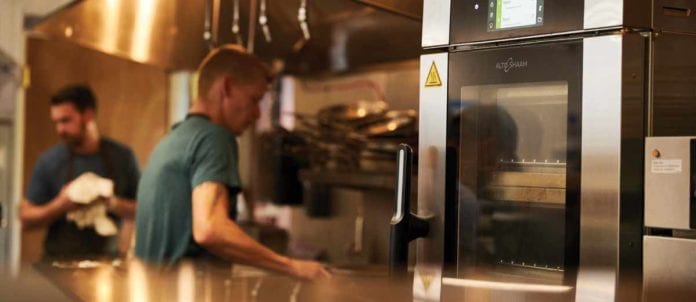The effects of COVID-19 have impacted the business landscape around the globe, including the foodservice industry and the suppliers that serve it. And, while some restaurants turned to technology and equipment to help shift their operating models during these challenging times, the majority of operators aren’t in a position to be investing in big-ticket items.
This environment has forced equipment suppliers to adapt the way they operate in order to continue serving their clients through the current crisis.
“Despite the ravaging effects of COVID-19 on the foodservice industry, and the fact we can’t physically visit customers, we’re still able to help our customers virtually via Facetime or on video chat,” shares Louis-Philippe Audette, president of RATIONAL Canada. “Should our customer have a culinary question, our corporate-chef team is available to our customers via our ChefLine. As well, our regional sales managers are taking the time to call and support their customers in any way they can.”
Wisconsin-based Alto-Shaam has also shifted to a digital/virtual strategy, ensuring its chefs and support and marketing teams are available to support customers. As Alto-Shaam president and Chief Operating Officer, Steve Maahs, explains, “we’re actually doing product demonstrations [digitally]. The number we’ve done have been very well received…obviously, the taste element is missing; beyond that, [the rest] of our messaging is being conveyed quite well through that method.”
For MEIKO Canada, the company is largely focused on the future. The company’s director of Sales, Gary Lee, notes while projects already underway have continued, day-to-day sales have been pretty much non-existent during the pandemic shutdowns. However, its dealer network continues to work digitally.
“Communicating with that end user is a challenge right now, because they have other issues to deal with,” he explains. “But, we’re ready to see them and talk to them as soon as they’re able and have the time to see us.”
In the meantime, the company is ensuring its dealer partners are prepared when new business returns, offering training modules through its e-learning portal.
Recognizing that safety and customer confidence will be key during the recovery process, MEIKO has had most of its dish machines and TopLine thermal washer-disinfectors certified by the German-based HygCen institute as having the ability to completely inactivate Coronavirus in a single wash cycle.
“We see food safety [moving] up the list of priorities for operators, because they’re going to want to give customers confidence…because you don’t want any possibility of any infections or contaminations being passed on,” says Lee, noting these certifications have been the main focus of the company’s marketing initiatives at this time.
“We’re going to be ready when the market opens [and] we’ll be able to go to the end users [with these certifications],” he adds.
“Everything that’s required to sanitize and reopen, whatever all of that that may be, is clearly where everyone’s focus and investment is going to be early on,” agrees Maahs. He believes sanitation will likely replace sustainability as a top priority when considering new equipment. “[Sustainability] is going to be less of a priority in the face of the loss of revenues that we’ve all experienced.”
“Sustainability, going into this, was very important. Long term, it will continue to be important…but, at the same time, now safety is going to be in that same conversation,” notes Lee.
“With so much concern around contamination with the virus, we’ll see more foodservice operators shifting away from buffet-styles of service and moving to à-la-carte plating,” says Audette. “We’ve already seen this with some of our customers in long-term care, who have begun testing the RATIONAL Finishing system.” This system allows users to maintain a safe environment when serving, while allowing kitchens to keep up without the stress of a hectic rush.
Maahs points to smaller kitchens and ventless equipment as trends that existed pre-COVID-19 that he expects to continue, as well as IoT and smart equipment.
“There’s been a little bit of an uptick in need for, or requesting of, holding equipment and warming equipment and more smaller-batch production equipment,” he adds, explaining capacity restrictions and continued focus on takeout and delivery will continue to support demand for such products.
“Fortunately, we have product like the Vector product category, [which is] more speed and small-batch oriented and [suits] operating under these conditions.”
“As dine-in service slowly begins to return, there will undoubtedly be a big adjustment,” Audette adds. “More businesses are seeing the importance of having technology in their kitchens and we don’t anticipate that changing. RATIONAL’s intelligent combi technology will be helpful to kitchens, which are looking to automate more of their cooking methods — especially those who are short on staff.”
Each of these suppliers agrees financing options will also be key as the foodservice industry recovers, as operators will be price sensitive.
“[Financing is] going to be challenging for operators if they’re looking to purchase equipment,” says Lee. He explains offering financing terms, rent-to-own and leasing programs will take some pressure off operators while allowing them to get equipment today.
RATIONAL has not ignored this fact, partnering with EconoLease to launch a leasing program. “This program will help ease the cost of ownership for these establishments,” explains Audette. “We have also waived our shipping costs for all of our customers to help them in this difficult time.”
ANOTHER POTENTIAL TREND
Alto-Shaam is keeping an eye on is operators developing an aversion to supply-chain risk and a potential desire to consolidate their suppliers. “[Operators will be seeking] suppliers that are trusted, have solid contingency plans and also provide more value and support,” says Maahs. “Everybody’s going to be right-sizing their operations and looking for more outside support.”
“We’re living through an historical event right now,” says Lee. “As we slowly recover and work together, we will come out of it. And then, [we’ll be] there to offer the solutions our customers have been looking for.”


















